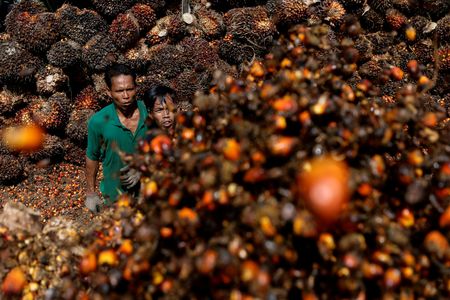 1
1 1
1

By Bernadette Christina and Fransiska Nangoy
JAKARTA (Reuters) – Indonesian lawmakers on Thursday requested the government review a ban on palm oil exports after industry groups warned that one of the country’s leading sectors could grind to a halt in coming weeks as storage nears full capacity.
Indonesia, the world’s top palm oil producer, has since April 28 halted exports of crude palm oil (CPO) and some derivative products in a bid to tame soaring prices of domestic cooking oil.
In a hearing with Finance Minister Sri Mulyani Indrawati, members of the parliament’s budget committee urged the government to “evaluate the CPO export ban”, though they did not discuss the policy in detail.
Sri Mulyani said she would raise their request with President Joko Widodo, adding the government is aware the export ban is estimated to reduce revenues by 6 trillion rupiah ($407.33 million) per month.
Meanwhile, the palm oil industry faced the prospect of having to halt operations if the export ban was not lifted by the end of the month, Sahat Sinaga, executive director of the Indonesia Vegetable Oil Industry Association told Reuters.
“Our estimate is if there are no exports by the end of May everything will be stuck, tanks will all be full,” Sahat said.
Indonesia has around 6 million tonnes of storage capacity, including at ports, and domestic stocks had reached around 5.8 million tonnes by early May, Sahat estimated.
At the end of March, domestic stocks rose to 5.68 million tonnes, up from 5.05 million tonnes a month earlier, Indonesia Palm Oil Association (GAPKI) data showed on Thursday.
Indonesia typically only uses 35% of its annual palm oil production at home, mostly for food and fuel.
GAPKI secretary general, Eddy Martono, said some companies had already stopped purchasing palm fruits outside their plantations and were slowing down their own harvests.
Sahat noted the ban was imposed when palm fruit production was typically high. But because of the export ban, only half the fruit would likely be used, causing up to 17 trillion rupiah ($1.15 billion) in losses for farmers.
Hundreds of palm oil farmers this week staged a rally in several cities to protest against plummeting incomes.
Trucks piled high with palm fruits have been stuck in a long queue outside a palm oil mill in West Sulawesi for the past few days, Irfan, a local palm oil farmer told Reuters.
Farmers who wanted to avoid further losses were bypassing middlemen and delivering palm fruits directly to mills, he said.
“But the mill is prioritising their partners, so the number of non-partner farmers are rising and waiting in a long queue,” Irfan said.
($1 = 14,730.0000 rupiah)
(Additional reporting by Stefanno Sulaiman, Zahra Matarani; Editing by Martin Petty and Ed Davies)